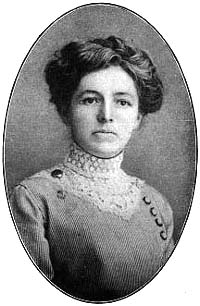Holyoke Municipal Milk Station
The Holyoke Municipal Milk Station, now in its second year, and, so far as known, the first purely municipal milk station to have been established in New England, owes its existence and success to several favoring sources. But its inception was due to the desire of the Holyoke Mothers' Club, connected with the Y.W.C.A., under the lead of Mrs. Sumner H. Whitten, to do something definite for Holyoke.

Mrs. Sumner H. Whitten
|

Miss Sadie Leion
|
In several years of successful work, one of the addresses that struck deep was made by Dr. J.C. Hubbard on the dangers of impure milk for babies and young children. When the Mothers' Club decided to bend it energies in a definite direction it chose Baby Feeding as its duty. To Mrs. Whitten is due the steady development of the plan to the point where the city was ready and willing to take it up. Local conditions were investigated, showing the great infant mortality in the congested districts, and the work being done in other cities was pointed out. From the very first it was urged that the work would be more effective if done under municipal direction, instead of as a charity, and if worked out under the direction of the physicians of the city. All of the physicians worked in support of the plan, and Mayor White and the city government were favoring.
So in June, 1911, the Municipal Milk Station was opened in a small shop on Sargeant street, in the most congested part of the city, and in a section where the infant death rate was unusually high. There were seven babies to care for at first.
Miss Sadie Leion, trained both as a nurse and social worker, was put in charge. It is due to the wisdom of the choice of superintendent that the Holyoke Milk Station had done such a fine and steadily increasing work. Miss Leion prepares the milk according to formula ordered by physicians, all the work being done under the most scientific and sanitary conditions. Besides she regularly visits the mothers in their homes and teaches them how to care for their babies, so that they will keep well. On September 1, 1912, seventy-six babies were taking this scientifically prepared milk from the Municipal Station. These babies are from all sections of the city, so that it has been necessary to open several substations. These have been opened in drug stores, the proprietors gladly joining in the movement. Miss Leion is still at the head of the work with one assistant, besides a young girl to assist in washing bottles.
The size to which the work has grown may be better grasped by the statement that more than six hundred feeding bottles have to be sterilized and filled every day. This, besides preparing the milk by four different formulae, attending to its distribution and visiting at the homes makes the present working force a much overworked body, but one that cheerily does its work because of the great results attained. The immediate result is a greatly reduced death rate of children under two years of age. The mothers pay for the milk and bottles and the city pays for the nurses and all costs of the Station.
The commission in charge of the Municipal Milk Station is the same that at first organized to establish it: Mrs. Sumner H. Whitten, chairman; Mrs. S.R. Whiting, secretary and treasurer; Mrs. Frank Fay, Mrs. F.J. Cloutier, Mrs. J. Bertram Newton, Mrs. L.H. Clarke, Mrs. James D. Bardwell, Mrs. F.H. Allen, and Mrs. William G. Dwight, directors.
The active medical staff includes Dr. Fred H. Allen, chairman; Drs. J.J. Carroll, J.J. McCabe, Jean Celce, and F.J. Cloutier.
© Laurel O'Donnell 1996 - 2005, all rights reserved
This document may be downloaded for personal non-commercial use only
and should not be reproduced or distributed without permission.
|

